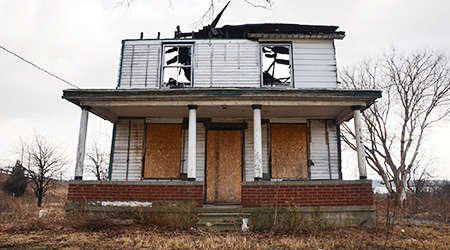How Long Does A Foreclosure Stay On My Credit Report?

A foreclosure will remain on a consumer's credit report for up to seven years and during that time can severely impact their ability to obtain a loan, get a job or rent an apartment. This is because a credit report is used for more than just getting approved for credit cards or buying a vehicle. A foreclosure can be significantly more damaging than other types of credit report black marks due to the size of the loan and importance of paying it back.
A credit report and its corresponding credit history is a direct reflection of a consumers ability to responsibly manage personal finances. While it may be expected, from a lenders perspective, to see a few missed payments or high debt to utilization ratio, the last thing they want to see are foreclosures and bankruptcies. That's not to say there are not perfectly reasonable explanations for why a home fell into foreclosure, but it raises significant red flags which lenders try to avoid. There is a common piece of information for new home buyers about the importance of paying mortgage. Regardless of anything else that happens in life, always make your mortgage payment.
Mortgage lenders will often begin the foreclosure process after the second missed consecutive mortgage payment. It can be a lengthy process and normally when a consumer is unable to make two or three monthly mortgage payments the writing is already on the wall. However, most lenders have no incentive to foreclose on historically good borrowers with good credit and will often work with a home owner to arrive at an equitable solution. Many lenders can assist borrowers by using a "forbearance" which can temporarily suspend mortgage payments until they get back on their feet financially. There may also be able to modify the loan interest rate making it easier for the borrower to make payments.
It is important to determine how severely a foreclosure will affect your credit score if there are no other alternatives. Most consumers will have to choose between letting their home fall into foreclosure or declaring personal bankruptcy. While a foreclosure will stay on a credit report for up to seven years, bankruptcies appear for up to ten years and are even more detrimental to your credit score. A foreclosures' impact can be mitigated if you have other revolving lines of credit or installment loans. If you have a number of credit cards, a student loan an automobile loan which are all in good standing with no missed payments then a foreclosure will have less of an impact. At a minimum, it shows the consumer had to make tough financial decisions which resulted in walking away from the largest expense to pay for everything else.
That said, a foreclosure will still be hanging around for seven years negatively affecting your ability to get loans. Even if you do get a loan, it will have above market interest rates and onerous terms. Employers are also using credit histories to evaluate whether or not to make a job offer and landlords will use a credit report when determining who can rent an apartment or lease a house. Before your home falls in to foreclosure, try all possible means to prevent it from happening like renting out a spare room or renegotiating your mortgage terms. Having a foreclosure appear on your credit report isn't the worst thing that can happen, it's only the second worst thing that can happen.







